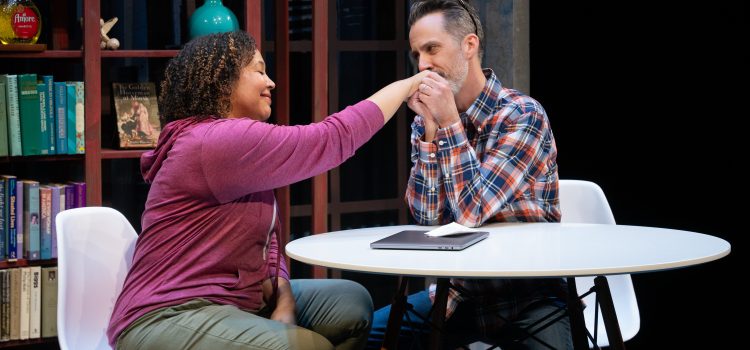By Lynn Venhaus
What is the cost of truth? And how will you pay for your own truth if it’s at the expense of another person’s goals?
In the engrossing drama “The Wanderers,” two married Jewish couples, from different time periods and circumstances, must navigate what exactly society’s social structure on togetherness means to them.
In the current New Jewish Theatre production, all the couple’s work is revelatory, and the execution is masterful. Their stories intertwine in interesting ways.
In the 1970s, Esther and Schmuli are Orthodox Jews who must follow a strict set of Hasidic Judaism rules, and their rigid roles as husband and wife are set, no variations in the Satmar community in Williamsburg, Brooklyn.
They have married the old-fashioned way – a business transaction made by their parents, with love not in that equation. However, they are very family-focused in their beliefs.
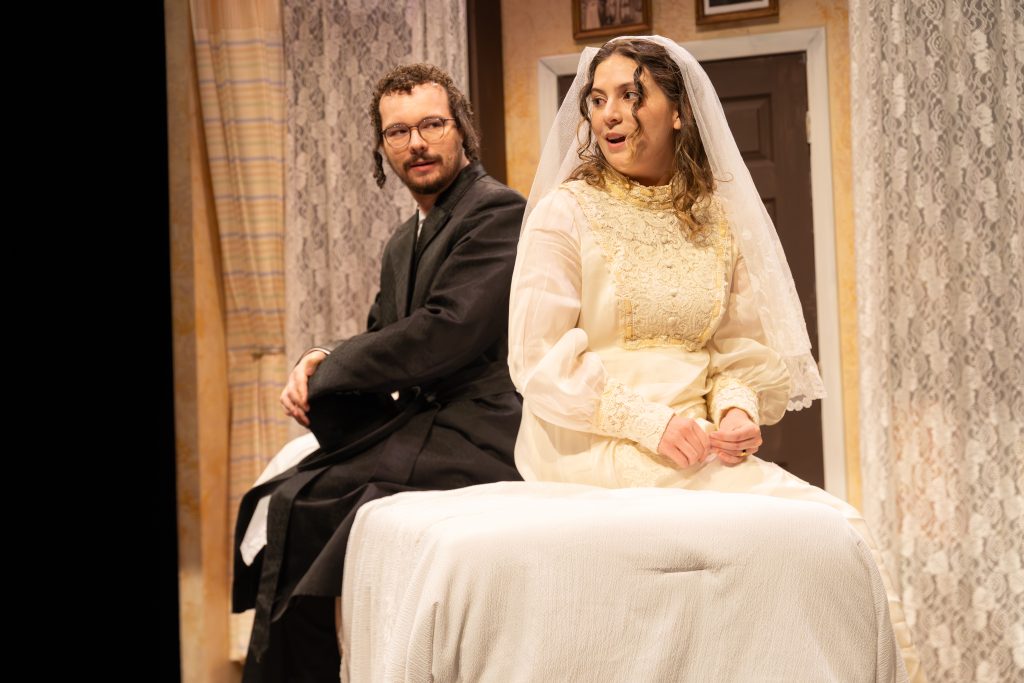
In exceptional nuanced performances, Jade Cash as the curious Esther and Bryce Miller as the conservative husband Schmuli are raising two daughters. Esther’s best friend has married for love, a man outside her faith and race, and they seem perfectly happy in their secular lifestyle.
While Esther learns more about the forbidden outside world, she’s intrigued by the personal freedoms she witnesses. Bound by the constraints of their religion, Esther is increasingly restless.
She’d love to go to school, become a librarian – and listen to pop music on the radio while she’s finishing chores. Meanwhile, she gives birth to a son, and that changes their family dynamic.
She will soon learn the cost of yearning. And Esther’s plight is gut-wrenching, for she will have hell to pay, all because she dared to dream of becoming a better version of herself. Cash, who is getting more impressive with each new role, tugs at our heartstrings as she questions the old ways.
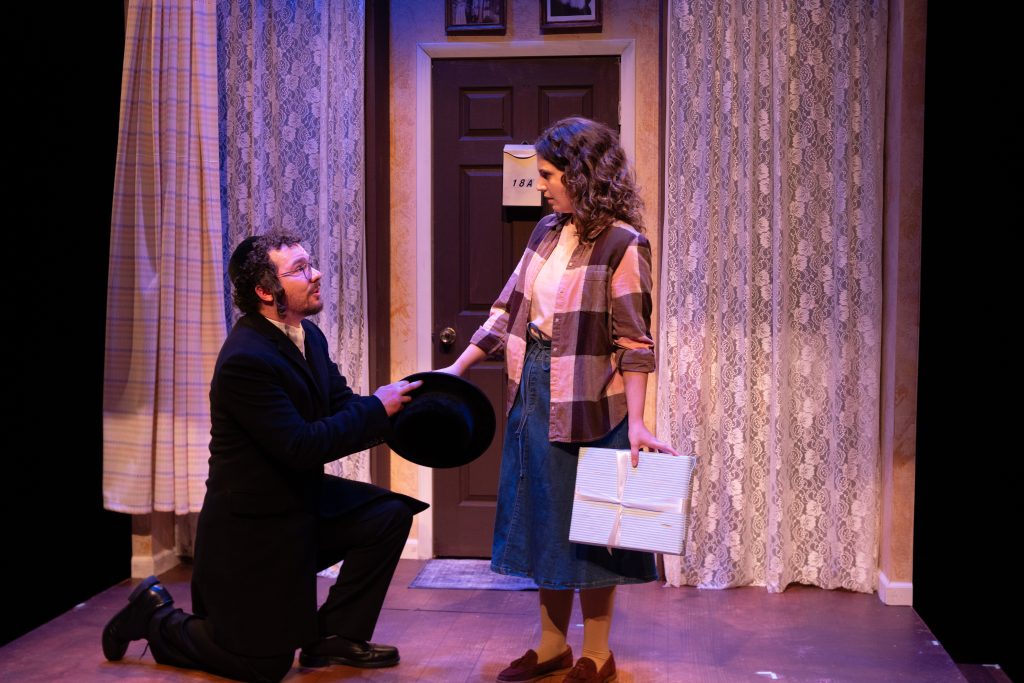
Schmuli is challenged, too, because he follows traditions, no discussion, no questions. He is worried about unfavorable opinions and family scandals. He’s caught in a cultural war and battle for identity that he doesn’t understand.
Miller, who immerses himself as the devout head of household, conveys Schmuli’s faith authentically. In his loneliness, he becomes conflicted, and attempts to grasp changing male-female roles.
In the alternating contemporary story (2010s, gentrified Williamsburg), the other couple, Abe and Sophie, don’t necessarily practice their faith but send their children to Hebrew School. They are not rule-followers, per se, but the couple, writers by profession, attempt to raise their children in a traditional yet modern family.
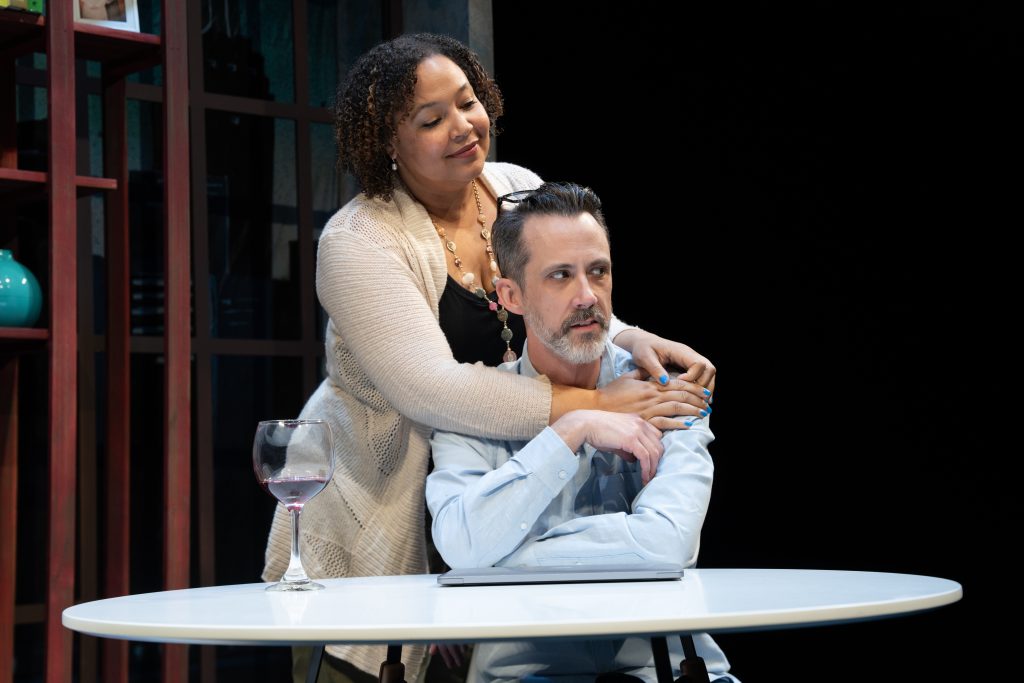
As they traverse a challenging emotional and spiritual landscape, neither Sophie nor Abe can let go of the past. Wendy Renee Greenwood gives a devastating performance as a wife, mother, daughter and writer who is holding her family together after facing numerous disappointments. She struggles with unfulfilled dreams and a widening gulf between her husband and her identity. Is never being satisfied going to be her destiny, just like Esther’s?
Her husband Abe, a more successful writer with a Pulitzer Prize and two National Book Awards, is tempted through an email relationship with a beautiful movie star. It starts harmless enough, as dreamgirl Julia Cheever came to a book reading of his. Flattered by that, he takes off into Abe-land when she sends him an email.
Maggie Wininger is luminous as the charismatic actress who has her own insecurities and personal issues while she practices her craft, deals with failures and successes, and tries to juggle everything for life balance. Think Julia Roberts, that kind of screen presence and popularity.
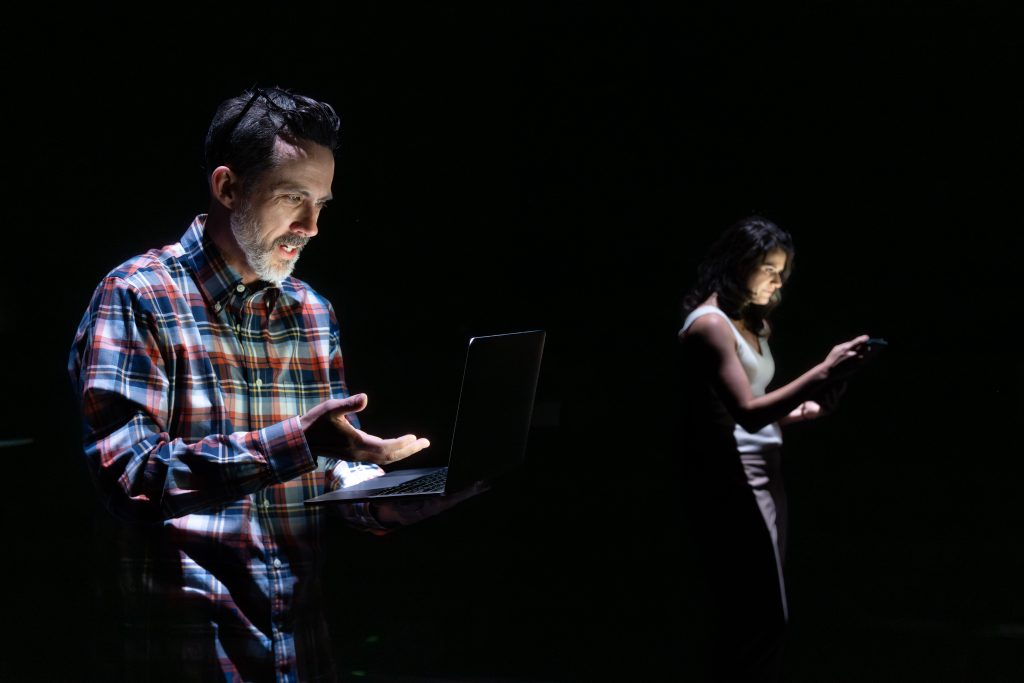
Joel Moses, as is typical, immerses himself in a rollercoaster journey involving growth, grief, self-doubts, emotional infidelity, and lack of effort to be present for his wife and two children.
Abe is gregarious, intelligent, conflicted and increasingly lost. Why can’t he see what he has and not what he hasn’t? When he crosses a line, can he go back and correct the mistakes he’s made?
Director Robert Quinlan brings out the intricacies between these couples and the ties that bind them – their family, heritage, dreams, desires and society mores.
He’s established these different worlds on opposite ends of a runway type set, with functional and efficient scenic design by Reiko Huffman, one of remarkable detail in intimate spaces.

IPlaywright Anna Ziegler’s twisty tale on relationships is fascinating in its entanglements. The play premiered in 2018, and debuted on Broadway in 2023. While not namechecking them per se, she explores the pledges a pair makes to each other in traditional wedding vows — “for better, for worse,” “in sickness and in health,” and “to love and to cherish” – in several vignettes.
In a layered – and sometimes dense — approach, she shows how unanchored they become trying to cling to what they assume is best for them. It’s a thoughtful play, looking at the joys and challenges of commitment in two different worlds.
Greenwood, Moses, Miller and Cash are fully invested in these roles, portraying each high and low with deep felt intensity. Wininger’s contribution is an interesting contrast of a famous person as fantasy and explaining her reality.
Their emotionally rich portraits engage and connect us to their characters’ motivations. Ziegler doles out their backstories, which led to their current plights in small nuggets. The couples get into situations in which there seems to be no escape, and this gives the play the necessary conflicts. While all vary in their beliefs, they admit their fears and show their vulnerabilities.
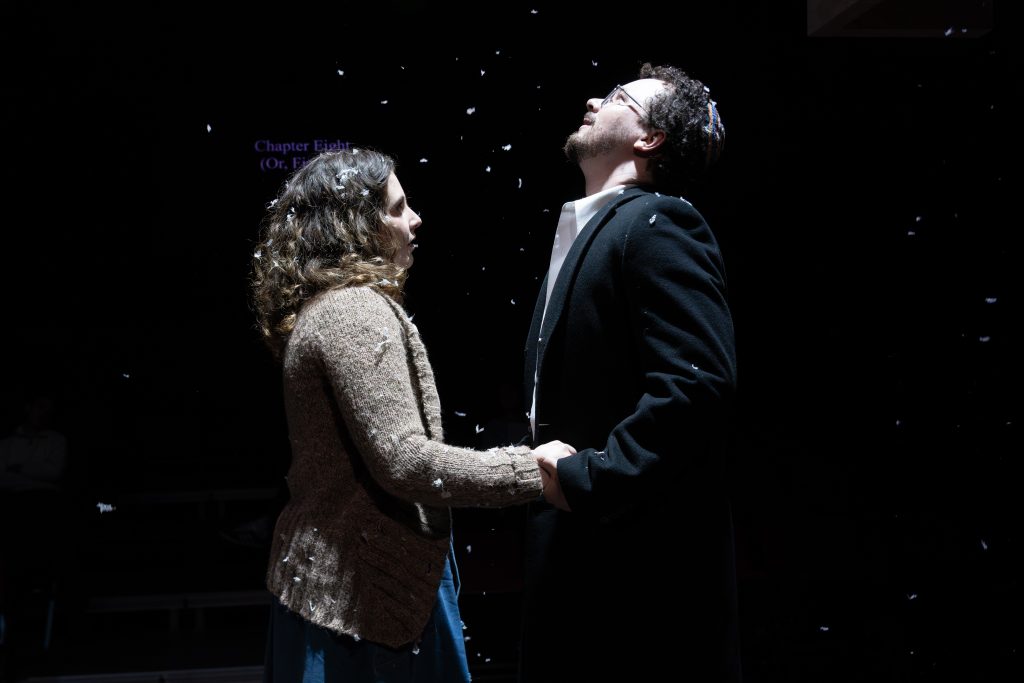
The technical work is strong in its storytelling, too, with Amanda Werre’s skilled sound design and lighting designer Jayson Lawshee’s striking choices between reality and fantasy noteworthy. Costume designer Michele Friedman Siler accomplishes the traditional Hasidic apparel while giving the contemporary story casual attire, and the movie star cosmopolitan career wear.
The specific time frames for looking at love from both sides are 1973 -1982 for Schmuli and Esther, and 2015-2017 for Abe and Sophie, with Albany, New York part of later storytelling.
Thought-provoking, and at times, frustrating, this examination of love and marriage is far-reaching in its complicated couplings. It is those layers that give the actors some real substance, and the audience intriguing questions to ponder, and conversations to begin..
New Jewish Theatre presents “The Wanderers” from Sept. 11 through Sept. 28, with performances on Thursdays at 7:30 p.m. Saturdays at 4 and 8 p.m. and Sundays at 2 p.m. at the SFC Performing Arts Center, 2 Millstone Campus Drive. For more information: jccstl.com/arts-ideas/new-jewish-theatre/current-productions.
The play is 1 hour, 45 minutes without intermission.
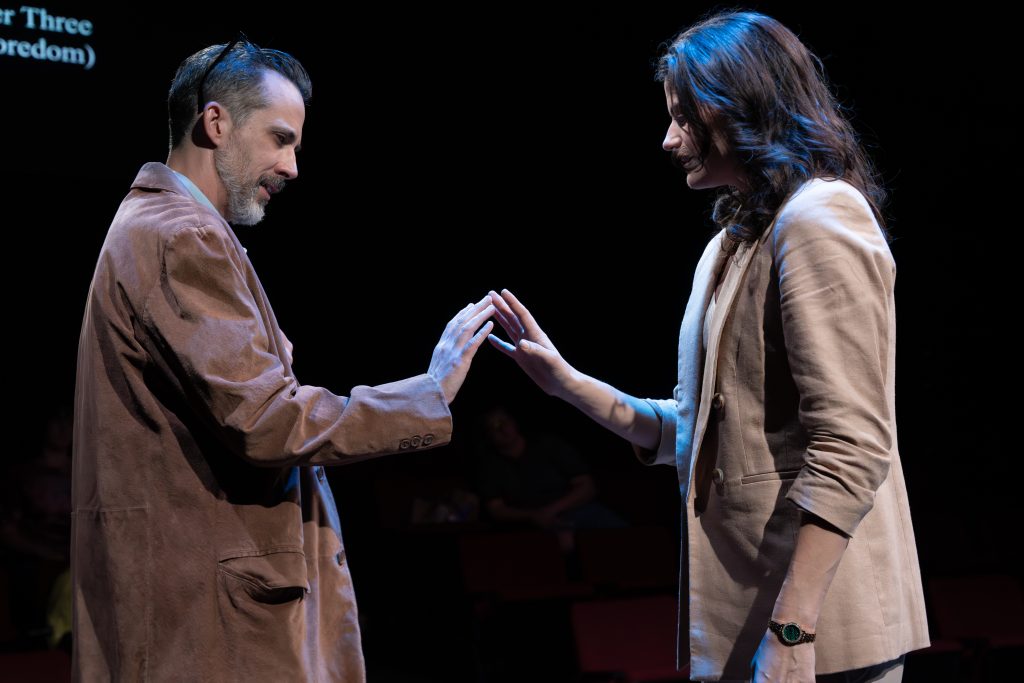

Lynn (Zipfel) Venhaus has had a continuous byline in St. Louis metro region publications since 1978. She writes features and news for Belleville News-Democrat and contributes to St. Louis magazine and other publications.
She is a Rotten Tomatoes-approved film critic, currently reviews films for Webster-Kirkwood Times and KTRS Radio, covers entertainment for PopLifeSTL.com and co-hosts podcast PopLifeSTL.com…Presents.
She is a member of Critics Choice Association, where she serves on the women’s and marketing committees; Alliance of Women Film Journalists; and on the board of the St. Louis Film Critics Association. She is a founding and board member of the St. Louis Theater Circle.
She is retired from teaching journalism/media as an adjunct college instructor.

